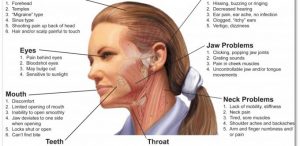TMJ Disorder Treatment
What is TMJ Disorder?
Simply put, TMJ disorder is a degenerative condition affecting the tempomandibular joint, located in your jaw. Your TMJ is the hinge that connects your mandibule, or lower jaw, to your upper jaw and skull.
Temporomandibular Disorder (TMD) typically affects individuals between the ages of 20 and 40 years old. Although it affects more women than men, more than 10 million Americans suffer from TMD overall, according to the Academy of General Dentistry.
What Causes TMJ Disorder?
TMJ disorder is the result of excessive chronic stress on the TMJ. Excessive stress on the TMJ is often caused by a muscle imbalance or misaligned bite, but the exact cause can vary and may include grinding the teeth (bruxism) or clenching the jaw. Over time, the extra stress on the TMJ causes the ligaments in the region to become elongated. The jaw muscles then shorted or lengthen in response to the over-stretched ligaments, leading to noticeable TMD symptoms.
TMD Symptoms
TMD may present minor symptoms, such as grating or clicking sound while you chew, or extremely painful symptoms, including neck and shoulder pain and severe migraines. The symptoms may be temporary, permanent or progressive.
In addition to the symptoms of TMD mentioned above, individuals who suffer from TMD often experience:
- – Tenderness or pain throughout the jaw, face and/or head
- – Swelling throughout one or both sides of the face
- – A tired sensation throughout the face
- – Limited range of motion of the mouth (i.e. difficulty opening the mouth widely)
- – A “locked” jaw
- – Trouble chewing
- – A misaligned bite
- – Toothaches and/or earaches
- – Headaches and/or migraines
- – Dizziness and/or vertigo
- – A ringing in the ears (tinnitus)
- – Problems hearing







